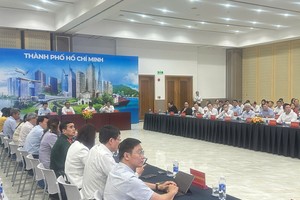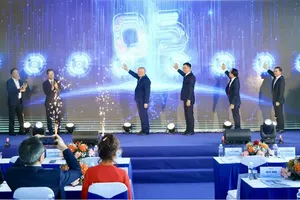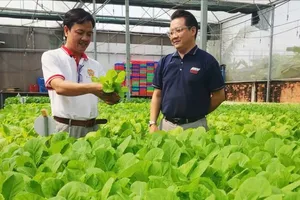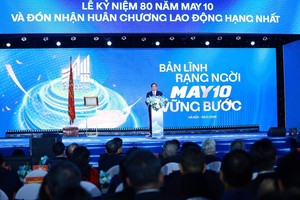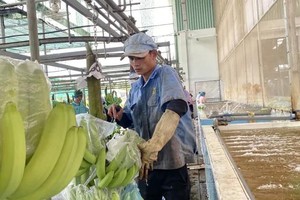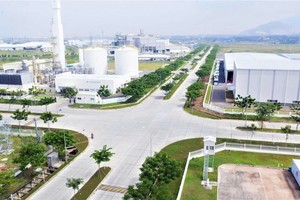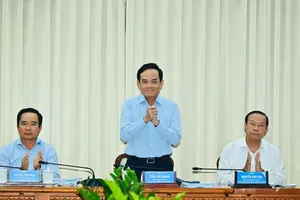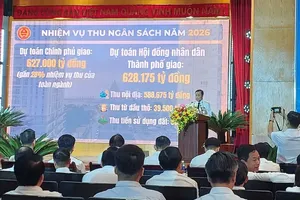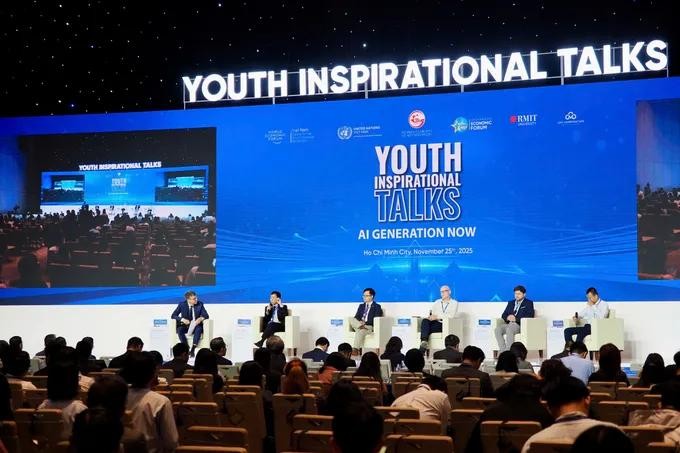
This morning, at the opening talk show of the Autumn Economic Forum 2025, a leader of the World Economic Forum (WEF) engaged in lively discussions with Vietnamese youth about AI.
At the talk show AI Generation Now, representatives of the Global Shapers Network—an initiative of the WEF—emphasized that the organization is focused on empowering young people worldwide to foster dialogue, action, and meaningful change. Amid the rapid rise of AI, young people must uphold core values and nurture human qualities to achieve sustainable success.
Being a medical staff, Dr. Ha Thi Thanh Huong of the International University, Vietnam National University Ho Chi Minh City, highlighted AI’s vast potential in developing ethical and sustainable healthcare solutions for Vietnam and other lower-middle-income countries. She stressed that the most important task for young people is to recognize and understand the issues within their communities, then leverage AI and available resources to address real-world challenges.
Making a strong impression during the discussion, founder Le Nguyen Bao Ngoc of Gen Zero—a climate action organization—shared that the group has reached more than three million young people, raised climate policy awareness by 70 percent, and supported youth delegates in joining the national negotiation team at COP30. As a pioneering member of the Digital Trust Alliance under the Ministry of Defense, she noted that youth participation in policymaking is expanding into the field of AI to protect vulnerable groups and strengthen digital trust within communities.
In an engaging exchange with Stephan Mergenthaler, Managing Director of the WEF, many Vietnamese youth posed sharp questions on AI entrepreneurship, the creative economy, equal access, and the role of the younger generation in shaping the technological future. The transparent and forthright environment, characterized by a commitment to exploring essential questions, was exactly what Stephan consistently emphasized: "Revisit the initial premise. Contemplate the issue thoroughly before considering the technology."
Addressing questions about employment challenges in the AI era, Stephan Mergenthaler cautioned against viewing the future as “AI replacing humans”. WEF data shows that most enterprises are actively reskilling their workforce and recruiting individuals capable of working alongside AI. “The most critical skill is interdisciplinary connectivity. Education must equip young people to move beyond narrow specialization to solve complex problems—something AI cannot replace,” he emphasized.
On the role of youth in AI governance, Stephan Mergenthaler stressed that responsible AI use must begin with small organizational decisions. With their natural familiarity with technology, young people will be the decisive force in ensuring AI is deployed safely and transparently. He noted Vietnam’s unique advantages: a young population, flexible mindset, and rapid adaptability. These form a vital foundation for building a robust AI ecosystem, retaining talent, and attracting high-quality resources.
Responding to a question from Vo Thi My Duyen, President of Hanh Trang Viet Development Company, about the greatest barriers preventing young entrepreneurs from creating AI solutions, Stephan Mergenthaler pointed out a common mistake: “Thinking about technology before the problem.” For years, global discussions have focused on AI boosting productivity or opening new fields, but much remains abstract. What is essential is grounding AI in reality, turning it into highly specific projects within enterprises. He stressed that companies need to investigate their most difficult challenges - those that exceed human ability to fully address. In these situations, AI is not the initial solution but rather a collaborator in executing resolutions.
According to Stephan Mergenthaler, the most effective public–private collaboration models are shared learning communities, where enterprises both draw from global experience and receive support in tackling “real problems.” Design thinking, the ability to ask questions, curiosity, and fundamental skills remain the roots for young people to engage with AI in the right way.
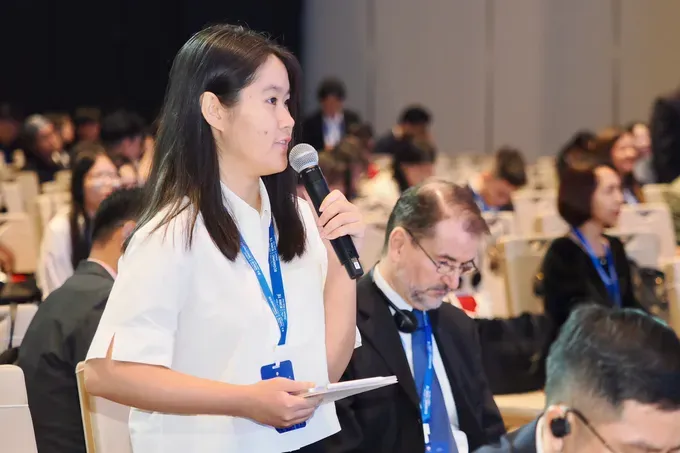
Young entrepreneur Ha Thi Tu Phuong, co-founder and CEO of Metub, expressed interest in the future of the creative economy over the next five years. Stephan Mergenthaler characterized it as a "dynamic, unpredictable, yet profoundly thrilling" domain. He observed that technology, especially the rise of more intelligent AI software, is reducing barriers to entry. Nowadays, individuals with minimal resources can still exert considerable influence.
He forecasted that creativity will persist in thriving from the grassroots, in a bottom-up manner, rather than being dictated by institutions. The cornerstone of multilateral cooperation lies in fostering environments that allow ideas to circulate while improving digital cognitive intelligence—the capacity to evaluate information, comprehend risks, and utilize technology responsibly.
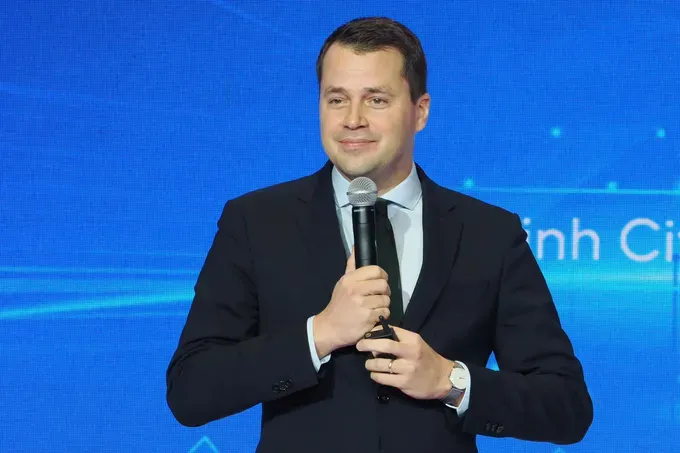
A student from RMIT University Vietnam, working at a fast-moving consumer goods company, voiced concern about the excessive reliance on AI among peers, driven by fear of missing out. “People think about technology before thinking about the problem, instead of having their own original mindset. Even simple questions are asked of AI rather than thought through and planned independently. In content creation, originality, creativity, and passion are crucial. So how can AI be used in these fields while preserving originality? How can it be applied more intelligently?” the student asked.
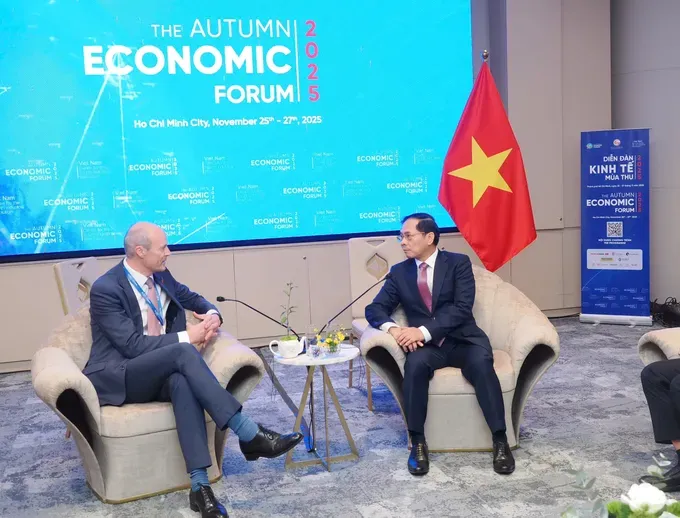
The CEO of the WEF also acknowledges that actions are often driven by tools rather than reflection. He emphasizes: "Instead of blindly trusting technology, we must return to the starting point."
At the event, Deputy Prime Minister Bui Thanh Son, Chairman of the Ho Chi Minh City People’s Committee Nguyen Van Duoc, together with the Executive Director of the World Economic Forum (WEF), representatives from UNESCO, and other international organizations, witnessed the signing ceremony announcing the partnership between RMIT University Vietnam and the Center for the Fourth Industrial Revolution in Ho Chi Minh City.


